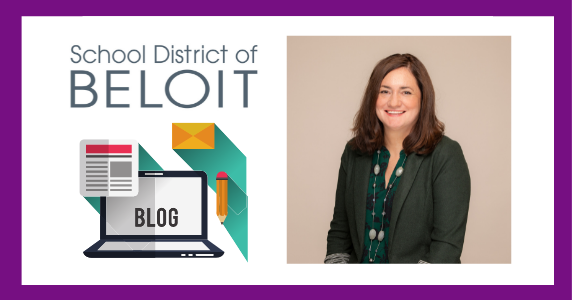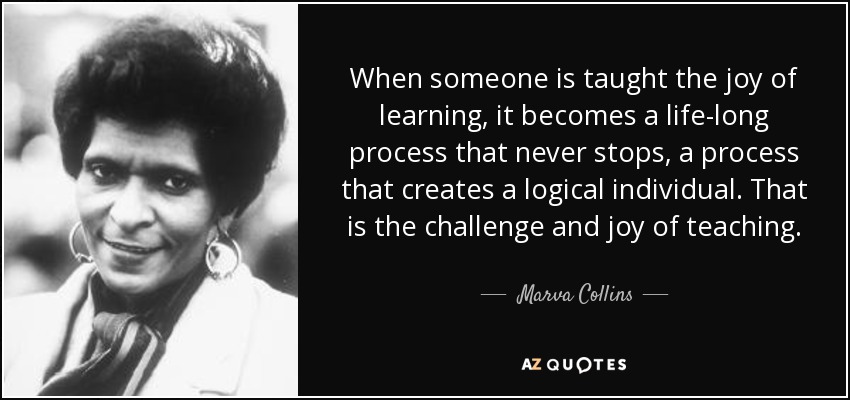- Beloit Memorial High School
- SDB Blog

Ms. Theresa Morateck
Executive Director of Teaching, Learning, and Equity, School District of Beloit
July 2021 - Finding JOY in Teaching and Learning Post-Pandemic

What does it mean to find joy in teaching and learning?
The topic of joy and education is not new, yet circling back to it post-pandemic seems more critical now
than ever. As our students return to full in-person learning, we have charged ourselves to begin to
reimagine more equitable (joyful) schooling experiences for our students. There is an essential need to
focus on the unfinished teaching and accelerated learning as a response to the “interruptions” over the
previous year. However, our intentional focus to provide challenging, grade-level instruction cannot come
at the expense of joy!
Joy for learning does not imply a lack of challenge or lack of an instructional focus. It means reimagining
experiences that can invite our students to love learning and to love school. These experiences can be
meaningful, relevant, and empowering!
We should also be sure we are not confusing joy with a toxic-positive culture. The joy of learning does not
imply that we are happy all of the time, either. We want our classrooms to be liberating experiences
where students are supported in learning how to regulate their emotions. We want our students to
connect positive emotions to learning, as we know, the emotional and social cannot be separated from
the academic.
Additionally, it is essential that we support our students through the productive struggle during learning,
as that is what moves our students into independence. Young people feel confidence and joy when they
achieve milestones - learning to read, being able to cite basic facts with fluency, understanding linear
equations, and achieving personal academic goals all bring that about.
So, what does JOY look like?
Some ways we can recognize joy at school:
• The bell rings and students are still engaged and in the midst of an academic discussion
• Students are fully attentive with “minds on”
• You can see students cheering on an event - the success of a science experiment, team work, etc.
• Students are smiling from being encouraged by their classmates and teachers
• Students are engaged in inquiry and have that “light bulb” moment
• Students demonstrate pride in their work and new learnings
• Students are motivated to share and teach others
• Students are engaged to continue learning more about a topic on their own
• Students demonstrate empowerment and confidence in their ability to engage in topics of
interest through discourse
How do we find JOY in teaching?
Teaching and learning are synonymous. For most teachers, watching our students experience joy in the
learning process is the biggest reward we could ask for. We find joy when our students find joy! The act of
engaging in meaningful work and having visible evidence of the difference we make in the lives of our
students is what inspires us
Some ways we can support our own Joy:
• Showing and receiving gratitude for our fellow colleagues, students, and families
• Communicating and celebrating points of pride and student success with our students, families,
and community
• Providing students with authentic opportunities to be free to be themselves and participate in a
community that promotes a sense of belonging
• Developing meaningful relationships with our students and colleagues by believing in them
• Challenging our own practices, taking risks, trying new things, and finding successes with our
students
• Engaging in professional learning communities and opportunities to build our toolboxes and
positive relationships
• Committing to our students being successful through collective efficacy- We CAN do it!
We have a lot of work ahead of us as an educational community post-pandemic. It is important that we
pause to reflect and remind ourselves of the critical role joy plays in our lives, our schools and our
classrooms.
I continue to be grateful for the dedication and generosity across the School District of Beloit. I know that
teaching is a calling and that with a continued commitment to our students’ reaching their fullest
potential, it is possible to work hard, have high expectations, and find joy in learning. I am inspired to
begin the school year with our students, families, and staff! And, let us remember to laugh and to dance
along the way.
Resources:
Christensen, Linda. (2009). Teaching for joy and justice: Re-imagining the Language Arts
Classroom. Rethinking Schools. Milwaukee, WI.
Shareski, Dean. (2017). Embracing a culture of joy. Solution Tree Press. Bloomington, IN.

